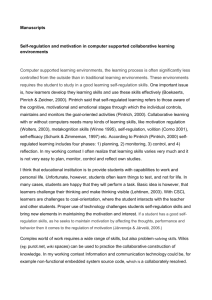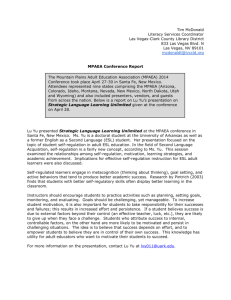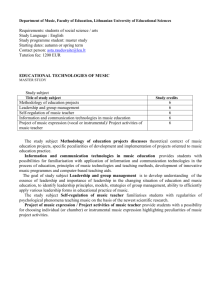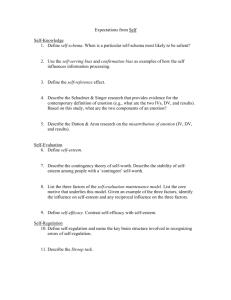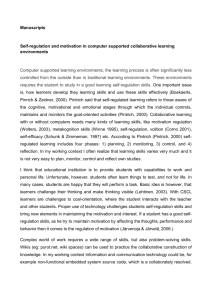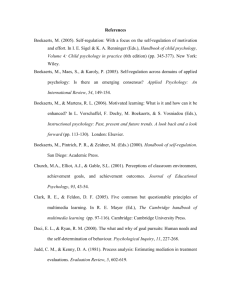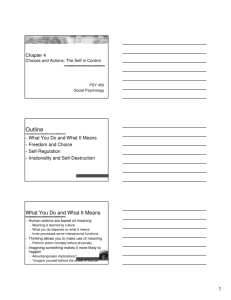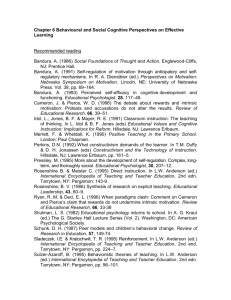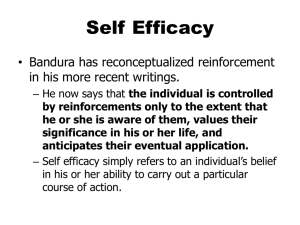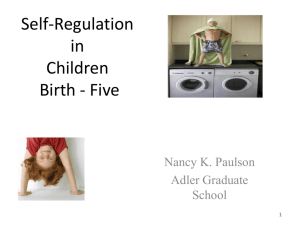Self-Exploration - Beth Cullor's Social Work e
advertisement
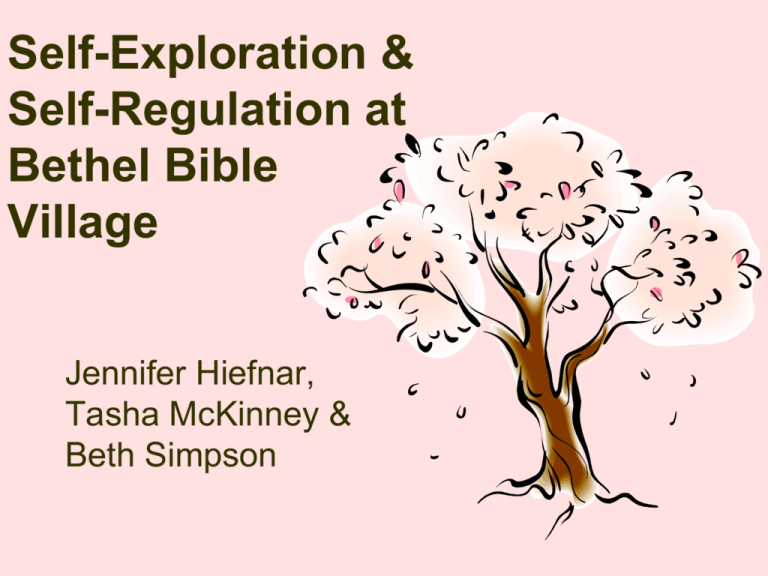
Self-Exploration & Self-Regulation at Bethel Bible Village Jennifer Hiefnar, Tasha McKinney & Beth Simpson What is Self-Exploration? • Self-exploration refers to the process of examining personal resources (e.g., strengths and weaknesses), to get a sense of one’s potential for change. • A lack of awareness of these resources or low confidence in them can reduce one’s perception that change is possible (e.g., Bandura’s self-efficacy theory). [Source: http://www.psy.tcu.edu/acr/self-exploration.htm] What is Self-Regulation? • Self-regulation refers to self-generated thoughts, feelings, and actions that are planned and changed to meet personal goals. • This process involves setting a goal or reference, acting in ways to move closer to the goal, and monitoring the success (or failure) of these actions. [Source: http://www.psy.tcu.edu/acr/self-exploration.htm] Outcome • As an individual who senses progress toward a goal feels satisfaction, this provides the motivation to continue to make progress. In fact, people who selfregulate, value their own feelings of selfsatisfaction and self-respect from successful change more highly than material rewards. [Source: http://www.psy.tcu.edu/acr/self-exploration.htm] Agenda • 4:00 – 4:15 / Introductions, Paperwork, “Getting to Know You” Exercise • 4:15 – 4:30 / Snacks • 4:30 – 4:45 / Presentation on SelfExploration & Self-Regulation; Q&A • 4:45 – 5:00 / Round Table Discussion on Personal Goals, Strengths & Weaknesses Agenda (cont'd) • 5:00 – 5:15 / Presentation & Discussion on Thinking Errors; Q&A • 5:15 – 5:30 / Personal Quizzes & Assessments; Discussion • 5:30 – 5:45 / Wrap-Up Evaluation #1 Evaluation #2 References • Bandura, A. (2000). Self-efficacy: The foundation of agency. In W. J. Perrig, & A. Grob (Eds.), Control of Human Behavior, Mental Processes, and Consciousness: Essays in honor of the 60th birthday of August Flammer (pp. 17-33). Mahwah, New Jersey: Lawrence Erlbaum Associates, Inc. • Bandura, A. (1997). Self-efficacy: The exercise of control. New York: W. H. Freeman and Co. • Carver, C. S., and Scheier, M. F. (2000). On the structure of behavioral self-regulation. In M. Boekaerts, P. R. Pintrich, & M. Zeidner (Eds.), Handbook of Self-Regulation (pp. 41-84). • Prochaska, James O., and DiClemente, Carlo C.(1998), Toward a comprehensive, transtheorectical model of change and addictive behaviors. In W. R. Miller, N. Heather (Eds.), Treating addictive behaviors (2nd ed.)(pp.324). • Zimmerman, B. J. (2000). Attaining self-regulation: A social cognitive perspective. In M. Boekaerts, P. R. Pintrich, & M. Zeidner (Eds.), Handbook of Self-Regulation (pp. 41-84).
